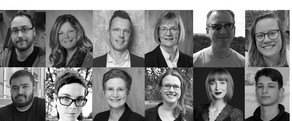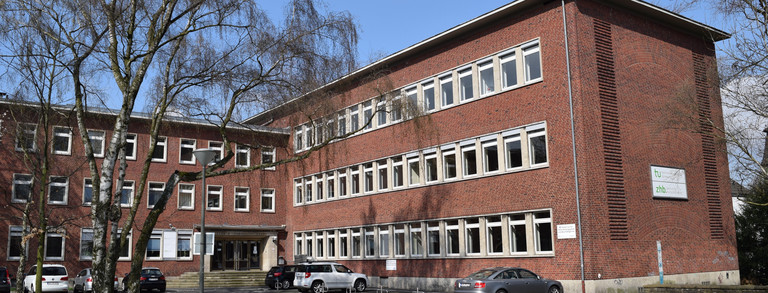Olga Wagner, M.A.
Olga Wagner holds a Bachelor’s degree in Educational Science (B.A.) from TU Dortmund University and a Master’s degree in Adult Education/Continuing Education (M.A.) from University of Duisburg-Essen.
She is already part of the chair team since November 2011, first as a student / graduate assistant and since October 2017 as a research assistant. Therefore, she has already gained a considerable experience in various research projects. In the context of her cumulative dissertation project, she researches the socialization of young careers. Her research interests particularly lie at the intersection of higher education, organization, and socialization.
Projects
- UnSicht - Die unsichtbaren Seiten der Qualität von Wissenschaft (since 11/2020)
- Aufstieg durch Bildung: Offene Hochschulen (10/2017 - 12/2020, and 04/2016 - 09/2017 as student and graduate assistant)
- TeachGov - Transformational Governance of Academic Teaching - Analyse der Wirkweisen transformationaler Lehr-Governance (10/2013 – 04/2016 as student assistant)
- Wissenstransfer von ausscheidenden Interessenvertretungsmitgliedern (11/2011 - 06/2013 as student assistant)
More information about Olga Wagner
Wagner, Olga & Wilkesmann, Uwe (2020). Sichtbarkeit der wissenschaftlichen Weiterbildung. In: Cendon, Eva; Wilkesmann, Uwe; Maschwitz, Annika; Nickel, Sigrun; Speck, Karsten & Elsholz, Uwe (Hrsg.). Wandel an Hochschulen? Entwicklungen der wissenschaftlichen Weiterbildung im Bund-Länder-Wettbewerb "Aufstieg durch Bildung: offene Hochschulen". Münster: Waxmann: 279-299. doi: doi.org/10.31244/9783830991069
Wagner, Olga; Vorberg, Ronja; Schmitz, Ernestine & Wilkesmann, Uwe (2020). Strategien der Motivierung und Rekrutierung von Lehrenden in der wissenschaftlichen Weiterbildung. Handreichung der wissenschaftlichen Begleitung des Bund-Länder-Wettbewerbs „Aufstieg durch Bildung: offene Hochschulen“. ISBN 978-3-946983-27-9
Wagner, Olga & Wilkesmann, Uwe (2020). Interview mit Prof. Dr. Gabriele Vierzigmann zu aktuellen Entwicklungen und Ereignissen im vergangenen und neuen Jahr mit Bezug zur DGWF. Online verfügbar
Schmitz, Ernestine; Wagner, Olga & Wilkesmann, Uwe (2020). Ein Blick zu den Nachbarn: Frankreichs Sammel-Fonds zur Finanzierung von (wissenschaftlicher) Weiterbildung. Online verfügbar
Wagner, Olga & Wilkesmann, Uwe (2019). Der Geschäftsführer und Vorstandsmitglied des Akkreditierungsrates Dr. Olaf Bartz im Interviewgespräch zum Thema: Akkreditierung und wissenschaftliche Weiterbildung. Online verfügbar
Wagner, Olga & Wilkesmann, Uwe (2019). Transparenz der wissenschaftlichen Weiterbildung durch internationale Rankings? Online verfügbar
Wagner, Olga & Wilkesmann, Uwe (2018). Interview mit Prof. Dr. Gabriele Vierzigmann der Vorstandsvorsitzenden der DGWF über aktuelle Diskurse in der wissenschaftlichen Weiterbildung. Online verfügbar
Wagner, Olga (2018). Expertinneninterview mit Prof. Dr. Esther Winther – Erkenntnisse und Empfehlungen aus parallelen und angrenzenden Forschungs- und Bildungsbereichen. Online verfügbar
Wagner, Olga; Schmitz, Ernestine & Wilkesmann, Uwe (2018). Beobachtungen internationaler Entwicklungen wissenschaftlicher Weiterbildung: Ein Blick nach Australien. Online verfügbar
Schmid, Christian & Wagner, Olga (2016). Problemlagen der Öffnung von Hochschulen. Erkenntnisse am Beispiel des ‚Realexperiments‘ Kiron Open Higher Education. Online verfügbar
- German Society for Higher Education Research (GfHf)
Academic Career
10/2017 to today: Research Assistant at the Chair of Organizational Studies and Management of Continuing Education, Center for Higher Education, TU Dortmund University
11/2011 – 09/2017: Student and Graduate Assistant at the Chair of Organizational Studies and Management of Continuing Education, Center for Higher Education, TU Dortmund University
05/2012 – 11/2012: Intern and Bachelor student on Selbstreguliertes Lernen mit einem Wissensmanagementsystem in der gewerblich-technischen Ausbildung at ThyssenKrupp Steel Europe (Duisburg und Bochum), Human Resources, Integrative Knowledge Management
04/2011 – 10/2011: Interviewer in the project "Emigma – Empoverment vom Migranten zum Klimaschutz", Department of Applied Social Sciences, Dortmund University of Applied Sciences and Arts
Education
10/2013 – 09/2017: University Duisburg-Essen, Adualt Education/ Continuing Education Master of Arts (M.A.)
04/2013 – 09/2013: TU Dortmund University, Educational Science Master of Arts (M.A.)
10/2009 – 03/2013: TU Dortmund University, Educational Science Bachelor of Arts (B.A.) (main subject) & Psychology (minor subject), study focus on Educational Management




